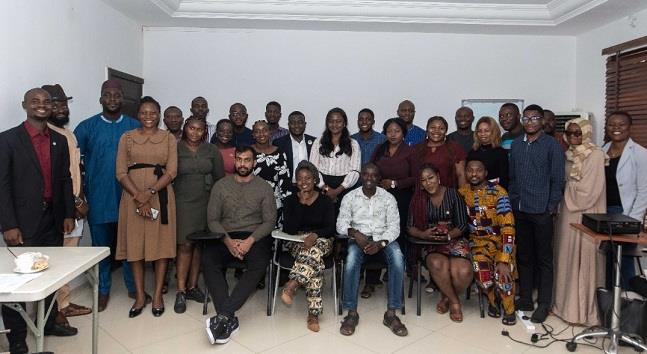Despite the pledge by President Muhammadu Buhari that Nigeria will achieve its net-zero target by 2060 at the 26th session of the Conference of Parties (COP26) to the United Nations Framework Convention on Climate Change (UNFCCC) held in November 2021 in Glasgow, it is obvious that there is still a lot to be done to march his words with action.

The International Climate Change Development Initiative (ICCDI) Africa believes that the starting point to realise this goal is to sensitise the public on the concept of net-zero and their role in its actualisation.
As part of its own effort to lead this process and bridge the knowledge gap, the group on Thursday, July 21, 2022, in Abuja, brought various stakeholders drawing from the energy, waste management, agriculture, media, as well as climate finance sectors together to brainstorm and develop a communication strategy that will help priorities what the nation needs to do to attain this aspiration.
It was an engaging and interesting exercise as the organisers reviewed the outcome of the first edition of the Net-zero Series that was conducted via webinar to provoke the minds of the participants and help them coin their messages in a manner that depicts the country’s pathway.
Presentations were made on the different components of net-zero including the responsibility of the media to communicate its idea. The Climate Change Act, Energy Transition Plan (ETP), and the Nationally Determined Contributions (NDCs) were also examined to draw attention to their nexus with net-zero objectives.
Most grassroots campaigners believe that net-zero is not the most pressing issue for local communities; instead, they feel that the focus should be channeled towards helping them adapt to the reality of the existing impact of climate change. They challenged the government to show the right political will by involving the state and local authorities in the implementation of the net-zero programme.
Achieving net-zero would require strong gas uptake across the economy, including 80% of cars being powered by compressed natural gas (CNG) and 50% of the population using liquefied petroleum gas (LPG) for cooking by 2050. Nigeria will need to have a wide range of energy resources at its disposal and invest more into hydrogen to meet up with its emissions reduction agenda. This is very important because of the need to balance the amount of greenhouse gases emission emitted all over the quantity removed to be able to fulfill her Paris Agreement on climate change.
Various social and economic groups need to be integrated into this plan and accelerate actions on the implementation of the act to accomplish this task.
The failure to implement the climate law, according to Olumide Idowu, Executive Director, ICCDI Africa, is a clear reflection of the government’s lack of commitment toward its net-zero promise.
The letdown arises from the fact that the law provides for the establishment of a Council to coordinate and oversee climate change activities in Nigeria. It also envisaged a five-year carbon budget and the approved amount of greenhouse gas emissions acceptable for a specific period.
Professor Chukwumerije Okereke, the Director, Centre for Climate Change and Development (CCCD) at the Alex Ekwueme Federal University, Ebonyi State, said that collapse is Nigeria’s real problem and not the concept of net-zero.
The act, he highlighted, is supposed to help Nigeria adopt a national strategy on green growth as a foundation to think more imaginatively in positioning its investment properly. It is also expected to kick-start sectoral actions that will foster the net-zero ambition.
One thing is clear; the Legislature has done its job by ensuring that the Climate Change Bill is now signed into law. However, it’s like there are attempts to allow some kind of embarrassment or a very poor image of the country because if a law is enacted with set timelines and it is not being implemented, then people are most likely not to take such a law seriously, which is not a good impression for Nigeria.
As a matter of fact, the enactment of that law especially when it was endorsed by President Muhammadu Buhari, the accolade that poured in locally and internationally cannot be pushed aside. The nation received those accolades and must reciprocate back by demonstrating that it is truly committed to what it has enacted as an act.
“That is the reason why some of us have taken the extra steps to write to the executive through the Minister of Justice, Secretary to the Government of the Federation (SGF), and also the Vice President because we all were working at the same level when this act was enacted,” says Sam Onuigbo, the man who sponsored the bill that has now become the climate change law.
Nigeria needs to bring on board those with the required knowledge to implement this piece of legislation, which is the reason why all hands must be on deck to ensure that it is delivered so that the nation is not viewed as being very flippant.
COP27 is coming up later in November, what is Nigeria going to report there?
Stakeholders must wake up to their responsibilities and demonstrate capacity through their initiatives, and not just answering big names without commensurate contributions towards realising the very essence of occupying such positions.
In conclusion, the legislature has done its own part, so the other one is with the executive to do to eliminate the prospects of Nigeria being looked upon as a very unserious nation.
By Etta Michael Bisong, Abuja
